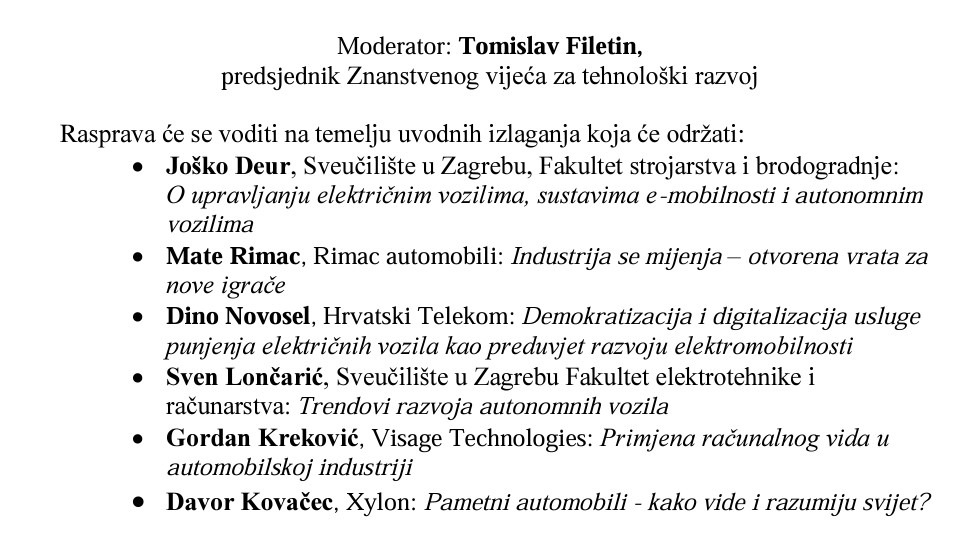Roundtable on Electromobility and Autonomous Vehicles
In the organization of the Croatian Academy of Sciences and Arts, Department of Technical Sciences, a videoconference roundtable on Electromobility and Autonomous Vehicles was held on November 6, 2020. Prof. Joško Deur gave a presentation on electric vehicle controls, e-mobility systems, and autonomous vehicles.
The development, production, and exploitation of electric and autonomous vehicles fall among the new industries based on knowledge, marking a turning point in transportation and energy usage as well as many accompanying industries, primarily those in the ICT sector. The electrification of transport, not just road transport, makes transport cleaner, quieter, and more energy-efficient. Due to the use of electric motor drives and generally a significantly smaller number of mechanical components, electric vehicles have a much longer lifespan (up to a million km in lifetime), and as such, change the paradigm of mobility, for example, towards vehicle sharing systems. With the application of optimal battery charging systems, electric vehicles become a support to the electric grid in terms of load balancing, continuous power supply, better utilization of the potential of intermittent renewable energy sources, etc. Ultimately, they provide greater driving pleasure and comfort, a higher degree of thermal comfort (e.g., preheating), and generally better connectivity. The development of future integrated electromobility systems requires a broad effort not only from the automotive industry, the energy sector, and other industries but also the fundamental development of new infrastructure with inevitable incentives from the public and private sectors. Autonomous driving also opens a new paradigm of transportation, creating opportunities for new business models of vehicle usage. To develop fully autonomous vehicles that do not require driver intervention, significant technological challenges need to be overcome, including perception and prediction of environmental conditions, advanced navigation and mapping, and advanced automatic control. Artificial intelligence enables solving such complex problems associated with the need to process various types of information and large amounts of data. As we move towards fully autonomous vehicles, the number of conditionally autonomous vehicles will grow, where the driver must take control of the vehicle in certain situations. In Croatia, there are a number of companies that are very relevant and competitive in the global market for making parts for electric vehicles, entire electromobility vehicle systems, and various types of software. At universities, but also in the industry, there is top-notch knowledge and potential for the future development of electric and autonomous vehicles. Presentations and discussions at the roundtable should provide insight into the state and development trends of the field in the world as well as a look at the state of the field in our country. Since this field is highly interdisciplinary, this event aims to encourage networking and cooperation, both in research and in development, production, and application of systems. The presentations and discussions should highlight the scientific, educational, technological, and organizational challenges and opportunities for future action. Full event details are available in the PDF.
Program:
